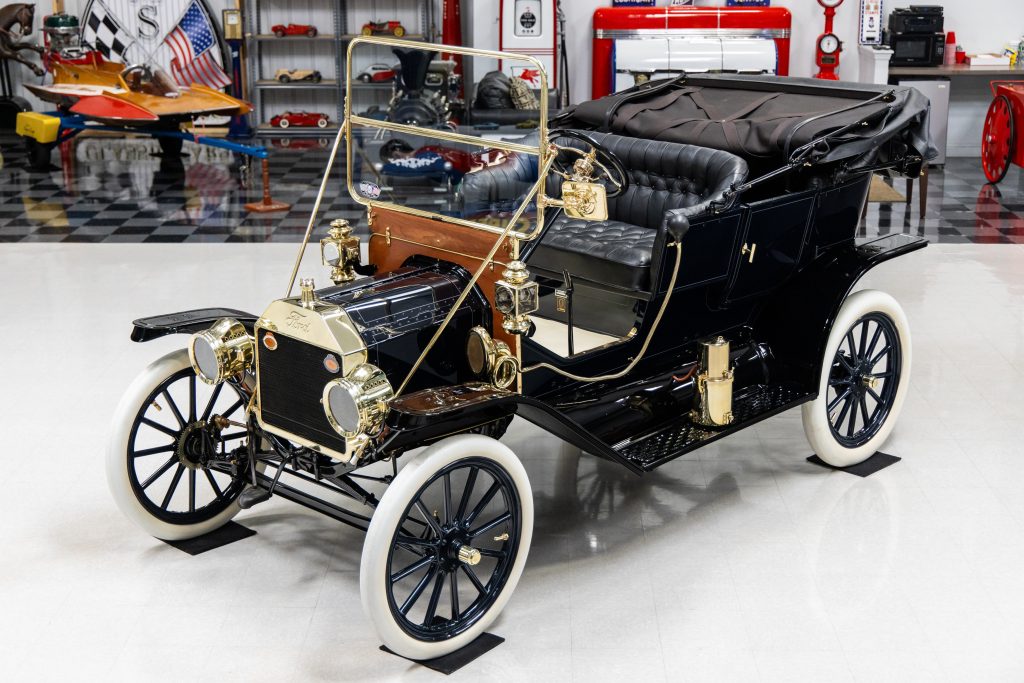























































































Description
This distinguished 1911 Ford Model T Brass Touring Car was the recipient of the prestigious Carl Benz Award for overall restoration, condition and originality at the Geneva d’Elegance in August of the 2021. The Carl Benz Statue trophy and framed description of the award are included. This wonderful example is also an AACA Senior National and Senior Grand National First Prize Winner. The Ford Model T is an automobile that was produced by the Ford Motor…
This distinguished 1911 Ford Model T Brass Touring Car was the recipient of the prestigious Carl Benz Award for overall restoration, condition and originality at the Geneva d’Elegance in August of the 2021. The Carl Benz Statue trophy and framed description of the award are included. This wonderful example is also an AACA Senior National and Senior Grand National First Prize Winner. The Ford Model T is an automobile that was produced by the Ford Motor Company from 1908 to 1927. It is generally regarded as the first mass-affordable automobile which made car travel available to middle-class Americans. As the framed copy of the Ford Motor Company build sheet that are included indicate, this car was originally a Touring model and shipped on April 10th, 1911. The Brass Touring model was the top of line in its day. From the information gathered this car was the product of a meticulous restoration in the late 1990’s. It was restored by Walter “Wally” Szymanski who was highly regarded in the Ford Model T and Model A community. Since completion it’s been part of a few private collections. During this timeframe it’s also been shown at various car shows where it’s been highly decorated. The exterior is simply stunning with its gorgeous styling of the early 1900’s. The 1911 model year was the first for a metal-skinned body. The body on this car is very straight with excellent panel fitment. The body was re-painted in its factory original color of Dark Blue which was dressed with Gray pin striping. The fenders and running boards were re-painted in its factory original color of Black. The show quality paint was recently detailed to a beautiful appearance by the team at MS CLASSIC CARS. The convertible top mechanism was restored, re-painted black and covered with a new black leather top that has a plastic rear window. The new front two-piece windshield is trimmed with brass. The two side and one tail brass Lantern lamps are made by E&J of Detroit, MI with a pat date of December 9th, 1908. The Ford Model 666 acetylene gas headlights were are also made by E&J of Detroit, MI. The authentic Rubes brass bulb horn and the Carbide brass generator dress the driver’s side. It rolls on metal wheels with wood-spokes that were painted blue with gray pin striping. The wheels have brass hubs and are wrapped with Cooker White 30 x 3 tires. The Ford Motor Company brass door sill plates invite the occupants into the rich interior. The wood dash is trimmed with brass. The dash supports an authentic Heinze Electric Company of Lowell, MA wooden box that houses the ignition system and retains the original serial #156048 tag. The dash also supports the authentic Stewart Brass Speedometer. The front and rear bench style seats are covered with black leather upholstery laid in diamond tufted pattern. The black steering column is connected to a brass 4-spoke steering wheel with black rim. It’s equipped with three black pedals that are each embossed with letters. The floor is covered with a white mat that’s embossed with Ford #F09-14. The rear doors open with the twist of the brass door handles and the inner door panels are covered with black leather. The engine compartment is highly detailed throughout. From the information gathered it’s believed to have its factory original 177ci Inline 4-clyinder engine based on the year of vehicle and engine casting number. This engine was factory rated with 20hp with a top speed of 42 mph. The engine breathes through a single exhaust system and is cooled by a brass radiator. The engine is coupled to a 2-speed planetary transmission. The undercarriage is also highly detailed throughout. Everything underneath was meticulously restored and painted black. The model T suspension employed a transversely mounted semi-elliptical spring for each of the front and rear beam axles which allowed a great deal of wheel movement to cope with the dirt roads of the time. The Model T did not have a modern service brake. The right foot pedal applied a band around a drum in the transmission which stopped the rear wheels from turning. The parking brake lever operated bank brakes acting on the inside of the rear brake drums which were an integral part of the rear wheel hubs. This car is one of the best examples of a 1911 Ford Model T Brass Touring car known to exist! From the MS CLASSIC CARS Collection.
1911 Ford Model T Brass Touring Car
Consignor Ratings*
*The following ratings were provided by the consignor, based on a scale of ‘Poor’, ‘Fair’, ‘Good’, ‘Very Good’ or ‘Excellent’. (Excellent = 100% restored)







